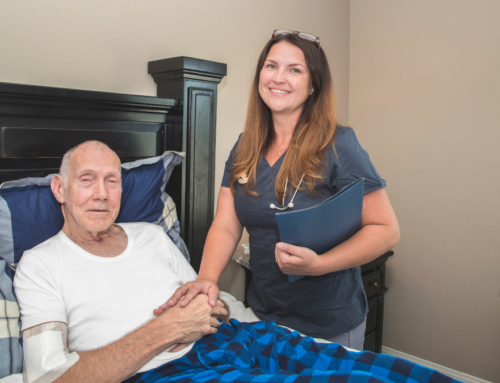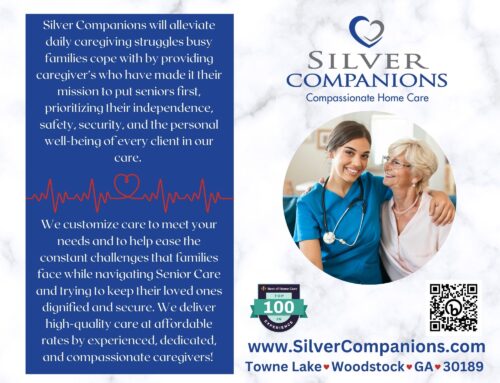
How to Know the “Right” Time to Get In-home Care for Your Senior Loved Ones
It’s one of the most difficult decisions to make – deciding when it’s time for your senior loved ones to have an in-home care provider.
Taking care of our aging parents is a delicate task that comes with a mix of emotions – and making sure they get the best possible quality of life can be a challenge. As our parents get older, it can become increasingly difficult to care for them the way we did when they were younger. At some point, getting our senior loved ones an in-home care provider might be the best decision for both of you, however, this is a big step and shouldn’t be taken lightly or without considerable thought. In this blog post, we will go over important considerations about making such a move as well as signs that it may be time for your seniors to have a professional career.
Signs that your senior loved one may need an in-home care provider
There are a few key indicators that your senior loved one may need extra help with everyday tasks or more frequent care. Knowing these signs can help you make sure your senior is getting the best possible care and quality of life.
Declining Personal Hygiene
If you notice that your loved one is struggling with personal hygiene tasks such as bathing, grooming, or dressing, this may be an indication that they require assistance. In-home care can help ensure they maintain good hygiene and prevent potential health issues.
Difficulty Managing Medications
Managing medications can be complex, especially for seniors who may have multiple prescriptions. If you see signs that your loved one is having trouble remembering to take their medications or is confused about their dosages or when to take certain meds, in-home care can provide medication management support.
Changes in Mobility
A decline in mobility can make it challenging for seniors to move around their home safely. This may lead to an increased risk of falls and accidents. If your loved one is experiencing difficulty walking, climbing stairs, or getting in and out of chairs, in-home care can provide the assistance they need to maintain their mobility safely.
Poor Nutrition
Maintaining a healthy diet is crucial for seniors, but it can become difficult as they age. If you notice that your loved one is skipping meals, losing weight, or making poor food choices, in-home care can help ensure they receive proper nutrition through meal planning and preparation.
Forgetfulness or Confusion
Occasional forgetfulness is normal, but if your loved one is consistently struggling with memory loss or confusion, it may be time to consider in-home care. Caregivers can provide support with daily tasks and help ensure your loved one’s safety.
Social Isolation
Seniors who live alone or have limited social interactions may experience feelings of loneliness and depression. In-home care can provide companionship and support, helping to improve their emotional well-being.
Difficulty Managing Household Tasks
If your loved one is struggling to keep up with housekeeping, laundry, or other household chores, it may be a sign that they need additional support. In-home care can help with these tasks, ensuring their living environment remains clean and safe.
Frequent Accidents or Injuries
An increase in accidents or injuries may indicate that your loved one is struggling with daily activities or has an increased risk of falls. In-home care can provide assistance and supervision to help prevent accidents and ensure their safety.
Caregiver Burnout
If you are the primary caregiver for your loved one and find yourself feeling overwhelmed, exhausted, or unable to manage their care effectively, it may be time to consider in-home care. This can provide you with respite and support, allowing you to maintain your own well-being while ensuring your loved one receives the care they need.
Communication Tips
Tips for communicating with your senior loved one about the transition to in-home care
Making the transition to in-home care can be a difficult and emotional process for seniors, but there are ways to make the conversation easier. Here are some tips on how to approach this sensitive topic with your senior loved one:
Be Understanding
Start by expressing your understanding of their situation. Show them that you understand how hard this change can be for them, and empathize with the emotions they may be feeling as a result.
Let them express their feelings
Give them the opportunity to express their feelings openly without judgment or criticism. Listen carefully and don’t try to offer solutions unless it is requested.
Explain why you think an in-home care provider may be the best option for them, and discuss the different ways in which it can benefit them. Be sure to emphasize the positive aspects, such as the chance to remain in their own home, and provide reassurance that they will receive personalized care tailored to their needs.
Emphasize your continued support. Let them know that you are there for them and will help to make the transition as smooth as possible.
Be patient and understanding
Be patient and understanding throughout the process, as it may take some time for your senior loved one to adjust to the idea of in-home care. Reassure them that you are always available if they need to talk or have any questions.
Be Positive
Keep it positive. Focus on all of the advantages and positives that come with in-home care such as the opportunity to stay in their own home and receive personalized care tailored to their needs.
Ask for help
Seek professional help or advice when needed. If your senior loved one is struggling with the transition process or if you’re unsure of how to proceed, it’s important to seek professional help or advice. A medical professional can provide valuable insight and guidance into the best course of action.
How to choose the right in-home care provider
Once you’ve made the decision to pursue in-home care for your senior loved one, it’s important to choose a provider that will best meet their needs. Here are some tips on how to find an appropriate and reliable in-home care provider:
Do your research
Take the time to research different providers in your area and find out more about their services and background. Make sure you read all of the fine print and understand what is included in the package.
Check references
Ask for references from other families who have used the provider’s services, or check online reviews for feedback about them. This will give you an idea of the kind of care and customer service they provide.
Set up a meeting
It’s a good idea to set up a meeting with your potential provider before making any commitments. This will give you the opportunity to ask questions about their services, get a feel for their personality, and assess whether or not they are a good fit for your senior loved one.
Be prepared to negotiate
Don’t be afraid to negotiate the terms and prices of the package – you may be able to get a better deal if you are willing to compromise.
In-come care in Cherokee County,Georgia
If you’re looking for a reliable and high-quality in-home care provider in Cherokee Georgia, talk to us, Silver Companions. We provide personalized care tailored to the needs of your senior loved one, and have a team of experienced and dedicated caregivers. Our services include meal preparation, housekeeping, medication reminders and personal assistance with activities like walking or dressing.
We offer flexible packages that can be customized to fit any budget or schedule, and we strive to make the transition to in-home care as smooth and stress-free as possible, and are committed to providing only the highest quality of care.
For more information about Silver Companions or to receive a free, no obligation, consultation, please visit their website at silvercompanions.com or call us at (678) 494-8129.
Together, you and your senior loved one can make an informed decision about in-home care that will benefit them for years to come. With the right provider, they can receive the personalized care and support they need to live a long and healthy life.
[/fusion_text][/fusion_builder_column][/fusion_builder_row][/fusion_builder_container]





